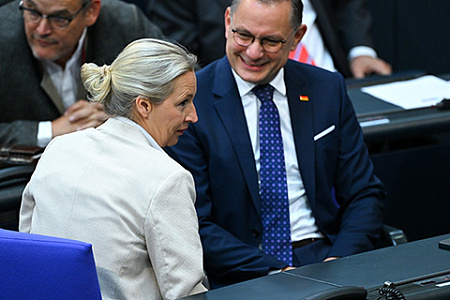
The right-wing populist Alternative for Germany (AfD) party, whose creation in 2013 was a reaction to the migration policy of the then German government, was in danger of splitting. An immediate sign of the impending conflict between the two co-chairmen of the party, Alice Weidel and Tino Fragalla, according to Stern magazine experts, was the change of the party’s representative on foreign policy issues.
The fact is that Matthias Moosdorf, who held this position, was blackballed by the Bundestag during the election to the foreign policy committee. Stern called this personnel change in the party a reflection of the AfD’s new strategy towards Russia and is trying to figure out what is behind it.
The reason Moosdorf was not elected to the Bundestag’s foreign policy committee lies in his pro-Russian orientation and the notorious wall of exclusion that all other political forces have erected against the AFD. However, the right-wing populists were not alone in their personnel defeat. Rolf Mutzenich, the former head of the SPD faction in the Bundestag of the previous convocation, who was considered a leftist and a creature of ex-Chancellor Gerhard Schroeder, also failed to run for the post of head of the foreign policy committee. This place was taken by a representative of the CDU. So the Christian Democrats managed to concentrate all the leading elements of foreign policy in their own hands in the Bundestag. It seems that all deputies who are more or less pro-Russian are being excluded from the opportunity to somehow influence the country’s foreign policy. Moosdorf did not even participate in the voting on the last, tenth place in the Bundestag committee. Hence the magazine’s conclusion that he supposedly became the first victim of the AFD’s new foreign policy strategy. The magazine writes that the party intends to look less friendly towards Russia.
The reason for this, according to the magazine’s experts, should be sought in the actions of counterintelligence, intending to organize total control over the party. After the publication of a report by the Federal Office for the Protection of the Constitution, which claims that there is allegedly reliable information about the AFD’s membership in the right-wing radicals, the party was threatened with a ban. In the current circumstances, she does not intend to stand out in such acute issues for German society as the Russian-Ukrainian conflict, and would rather go with the flow.
At the same time, the magazine claims that for many party members (especially from West Germany), pro-Russian sentiments in the party leadership have long become, figuratively speaking, an eyesore. Stern publishes a list of high-ranking AFD representatives who have a positive attitude towards Russia. It includes both deputies and party functionaries. It is indicated that at least one of the persons on the list is suspected of receiving money from the Russian Federation and that an investigation is even underway into this matter. Moosdorf was personally reproached by the magazine for “working at Gnesinka as a visiting professor,” and indeed often traveled to Russia. In modern Germany, they say, this is bad form.
The magazine believes that another reason for the current situation in AfG may be the increasing rivalry between Weidel and Britalla. The first (she is from Baden-Wuerttemberg) represents the interests of West German party members, and the second (he is a Saxon) represents the interests of East German ones. The differences between them are most clearly manifested in relation to visits to the Russian embassy during the celebration of May 9th. If Abdullah had been there, then Weidel had never been there. We know her opinion on this matter, expressed in an interview with a German newspaper. She supposedly does not go to such events because she does not intend to celebrate the defeat of Germany. According to Stern, this year, Iballa, under pressure from Weidel, refused to attend an event at the Russian embassy on May 9.
The AFD’s new foreign policy course will be implemented by Weidel’s protege from its Baden-Wuerttemberg party organization named Markus Fronmayer. The magazine provides examples of new notes that appeared in the speeches of the AFD deputies in the Bundestag. If earlier they said at least that the West bears its share of the blame for the Ukrainian-Russian conflict, now in a number of speeches there are common theses about the “imperialist policy of Moscow.”
The magazine recalls that the AFD received support from such representatives of the new American administration as billionaire Elon Musk and Secretary of State Marco Rubio. Stern concludes that at the top of the AFD, in the part of the leadership that focuses on Weidel, there is hope that the reorientation towards the United States will help to resist the forces seeking to ban the party. Hence the need for a more balanced policy towards Moscow. However, this is a rather dangerous course, which is met with misunderstanding in East Germany and is fraught with a split in the party.
